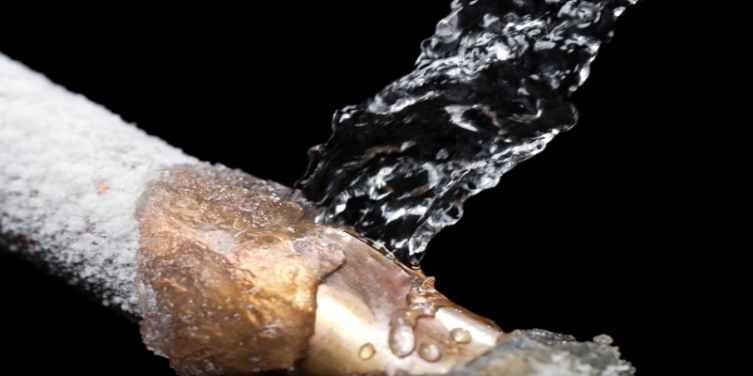
Cold, wintery weather can make life uncomfortable for a variety of reasons, but when it causes a pipe to bust in your home, well, that can create a whole new level of discomfort. But do pipes exposed to cold weather for an extended period always burst?
Frozen pipes do not always burst; however, when pipes freeze, the risk of them bursting increases significantly. The good news here is, there are steps you can take during cold weather to help minimize the risk of this happening — saving you the hassle and cost of expensive repairs. In this article, we review some of the common reasons why pipes burst and provide a few simple ways to maintain and thaw them.
Why Pipes Burst
Pipes typically burst when exposed to extremely low temperatures for an extended period of time (anywhere from 1-3 days depending on temperature). This is especially true for pipes located on exterior walls. A frozen pipe is likely to burst when any water or liquid trapped within it freezes and begins to expand. When this happens, pressure begins to build within the pipe. If the temperature continues to stay below freezing, the liquid will continue to expand causing it to rupture the pipe at its weakest point. But do frozen pipes always burst in this situation? No – but without some attention and maintenance, you increase the risk that it will happen.
What to Do About Frozen Pipes
While there are no guarantees that a pipe won’t burst during cold weather, there are several steps you can take to help protect pipes in your house from freezing.
Drain Exterior Lines: Ideally, before extremely cold weather arrives, take time to drain any water lines on the outside of your home. This will help prevent water from building up in the pipes, freezing, and possibly rupturing the pipe. This includes all hoses, sprinkler lines, and pool plumbing.
Open Cabinet Doors: While it may sound silly to keep your kitchen cabinet and bathroom vanity doors open, doing so allows the heat within your home to warm pipes that would otherwise be shut away. This is especially important if these pipes run along an exterior wall.
Turn Up Your Heat: Keep your thermostat at a higher temperature throughout the day and night. This will not only help keep your whole house warm, it can also help warm your plumbing system. When it comes to pipes freezing and potentially bursting, even a few degrees can make a big difference.
Slow Drip Method: Allow faucets connected to an exposed pipe to trickle when the temperatures are around or below -6 degrees Celsius. For example, if your kitchen sink is located under a window on an exterior wall, allowing the faucet to drip (warm water is best) will help keep water in the pipe moving and make it less likely to freeze. This method can also be used to keep underground pipes from freezing.
Monitor Faucet Dripping: If you notice that your slow drip has seized, or that any pipe within your home is no longer working do not try to thaw your pipes with an open flame or by dousing them in hot water. The drastic temperature change could cause the pipe to burst (and an open flame creates a fire hazard).
Thawing Frozen Pipes: If you suspect a pipe is freezing, or frozen try turning on the faucet fully to relieve any pressure and/or use a blow dryer, heat lamp, or space heater to gradually and safely increase the temperature of the pipe. If possible, it is recommended to turn off the main water line before attempting this (to relieve the water pressure).
Pipe Freeze Prevention Methods
Pipe Insulation: Insulating your pipes is one of the best and most effective ways to protect them against freezing/bursting. Although this is not a guarantee, a well-insulated pipe will be much better equipped to withstand extended periods of cold weather. A licensed plumber can offer recommendations on which pipes in your home should be insulated and the best way to do it.
Regular Plumbing Inspections: Another good way to prevent pipes from freezing and/or bursting is to schedule a thorough plumbing inspection. This can help identify any hidden leaks, drainage problems, or other unforeseen issues within your plumbing that may have gone unnoticed. Repairing any issue early could prevent bigger problems later. Remember, when it comes to plumbing, it is always best (and less expensive) to be proactive.
Let the Pros Help
Although you can’t control the weather you can control how you deal with it. Taking proactive steps to protect your home plumbing against extreme cold can help you avoid the headache and hassle of dealing with a burst pipe (including expensive repairs).
With over 50 years of experience in residential plumbing, the experts here at Mr. Rooter can provide you with preventative and emergency services to address all your plumbing needs. We guarantee a simple and stress-free experience, that includes flat rates (day or night), no overtime charges, repairs on the first visit, and a guarantee on parts and workmanship. Contact us today online or by phone to learn more!

